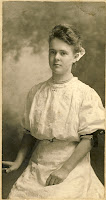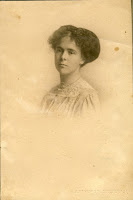Harold Roy Skilling was born on July 31, 1893 the eighth child of Agnes Ruxton and John Skilling. The seventh child, John Alexander had died a few days after birth in 1891. Harold was four years younger than his older brother Bill.
As he was growing up, Harold was always known as the “quick one”. He was a very alert child and as a young boy was always willing to run errands for his mother. He seemed to anticipate her needs and, for example, would be away down into the cellar to fetch the milk or cream before he was even asked to go. His snapping brown eyes were watching everywhere to see what he could do to help and when. This alertness carried on well into his later years. Harold always supported and was kind and thoughtful to his younger siblings, Norma and Verne.
Harold had a beautiful tenor voice and when the family got together he would harmonize with them making a beautiful chorus.
Harold finished his primary and secondary schooling in Teeswater and then attended the University of Toronto ( Victoria College) as an undergraduate.
Harold’s high school sweetheart was Etta Redburn who lived with her parents and sister Myrtle on Main Street about 3 blocks from the Skilling family in Teeswater.
When war broke out, Harold enlisted in the 5th Field Ambulance Medical Corps as a stretcher bearer. He was wounded seriously in the abdomen at The Battle of the Somme, September 1916 and was sent back to England to recuperate. After his discharge from hospital, he transferred to the Royal Flying Corps (RAF). He received his wings and completed flight training on Sopwith Camels, but the war ended just as he was ready to go on duty as a pilot. He returned to Canada in July 1919.
All the time Harold was overseas, Etta Redburn wrote to him faithfully and sent parcels. Strangely, when he returned, for some unknown reason, he didn’t want to have anything to do with her. This act was quite out of character for Harold and he never explained his actions. Harold worked for his older brother Orville delivering milk and eggs during the summer of 1919 and then in September entered the School of Dentistry with the Class of 2T3. While at school, he was Class President and Secretary, and wrote the Class Newsletter.
Money was very hard to come by and Harold had a difficult time paying his way through Dental College. May and Gert helped him a lot and so did Orville.
 |
| Harold Skilling Delivering for Orville Toronto, 1919 |
In Toronto, Harold met Eleanor MacDonald from Orillia who ran an upstairs tea room near Adelaide and Yonge Streets. Harold spent a lot of time at The Blue Gingham Tea Room while a student. After he graduated in 1923 he began his practice and he and Eleanor were married on July 15, 1925.
Harold and Eleanor had no children and by 1928 Eleanor was doing volunteer work in the community. One job was driving a woman with four children who was expecting a fifth, to the doctor’s or the hospital, wherever she needed to go. The woman’s husband was a milkman and earned a poor wage. The mother died when the baby boy was born and the father didn’t know how he was going to manage. Though filled with grief by this tragedy, eventually Harold and Eleanor were able to adopt this beautiful baby boy whom they named Donald Roy Skilling.
Don grew up to be a handsome young man and made his parents very happy and proud. He married Jean McKeown in 1950 and with her help, had a successful paint and decorating business in Hamilton. One rainy night in January 1963 when his daughter Lynn was 9, Don was driving home alone from Hamilton and crashed into an abutment, killing himself instantly. Harold and Eleanor never got over this loss. Neither did his daughter.
Harold’s career as a dentist continued to build successfully in his Bloor St. W. office. He was an honourary life member and past-president of the Academy of Dentistry, was on committees of the Canadian Dental Association and contributed to its journal. He conducted a program of preventative dentistry in East York schools.
Harold was a charter member of the Toronto Optimist club which his brother Bill had started in 1924 in Canada. He chaired every major committee, becoming President in 1936. He was actively involved with helping boys through the Optimists and got the club to sponsor a Junior Drum and Bugle Band which appeared at the CNE.
Harold was a charter member of the Toronto Optimist club which his brother Bill had started in 1924 in Canada. He chaired every major committee, becoming President in 1936. He was actively involved with helping boys through the Optimists and got the club to sponsor a Junior Drum and Bugle Band which appeared at the CNE.
He was active in Timothy Eaton Memorial church where he sang in the choir in his undergraduate years.
Harold also did a lot of pro bono dental work for family members. David and Rosemary were sent to Uncle Harold as were all of Grace’s children. Grace has provided some details:
Around 1938 “when Ross and I were first married, Ross was having a serious dental problem and the dentist in New Toronto wanted to extract all his teeth and put in an upper and a lower plate. Ross was horrified and talked it over with Uncle Harold … (who) said that if he followed his directions to the letter, he could help him. Of course Ross did. He had him use thin elastic bands to clean his gums, like flossing teeth. Then Uncle Harold did some deep cleaning of the gums too. Years later, Uncle Harold said he would like to take Ross to the Dental College to demonstrate what could be done with a bad case of gums“. Ross still had all his teeth in 1984 at the age of 79.
Grace continues:
“Our children all had orthodontic work done by Uncle Harold. Barry was the worst. We had a terrible time keeping those appliances in, as Barry would pry them out and throw them away. Uncle Harold persisted as no one else would have, and Barry would be a much less handsome boy if he hadn’t.
When Allen was teaching, he got into a car accident and had his front teeth knocked out. Uncle Harold nearly cried when we brought Allen in to him, as Allen was the only one of our children that had perfect teeth and hadn’t needed braces. Needless to say, Uncle Harold did a super job and Allen is very thankful.”
In 1978 Harold collapsed suddenly of a massive heart attack while shoveling snow and died in hospital three days later on January 25th. Norma was deeply affected by his death and it inspired her to write her family story.







